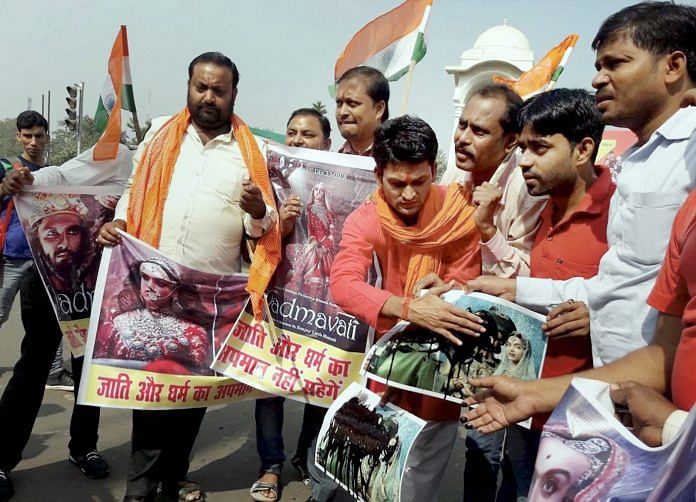For years, Indian liberals have fought for the right to freedom of artistic expression — the paintings of M. F. Husain, Jatin Das, movies like Fire and PK and readings of the Three Hundred Ramayanas.
As calls rise for a ban on the release of Padmavati — a film that valourises Rajput caste identity and glorifies sati — we ask:
Is Padmavati forcing Left-liberals and feminists into an awkward silence on the question of unqualified freedom of expression?
India, Ashis Nandy has argued, is primarily a nation of communities. And this precisely is the problem with dominant conceptions of the Indian nation, whether the secular idea of India as a syncretic amalgam of peoples or the imagined Hindu nationalist community of Savarkar.
The idealisation of community, with its roots in colonial narratives of identity, has been kept alive in the postcolonial era by both society and state. It rears its ugly head every time any community claims its identity is under threat, usually as a result of a statement or work of art that allegedly dishonours the community.
The controversy over Padmavati is no different. While the predictable political theatre over it has taken on alarming dimensions with calls by Hindu Right groups for beheading Deepika Padukone, no less disconcerting is the warped logic by which the right of Padmavati to be screened is defended: it does not dishonor Rajputs; Padmavati is not debased by Khilji; Padmavati did not even exist etc.
Here are other sharp perspectives on Padmavati and the freedom of expression:
Manish Tewari, lawyer, former UPA minister
Hilal Ahmed, Associate Professor CSDS
Sabah K., journalist, ThePrint
Apar Gupta, lawyer
All of which is besides the point that Padmavati, whether she had lived or not, is not the symbolic property of Rajputs and that the principle of the individual right of an Indian citizen to express their views on Padmavati should take priority over community reactions.
Neither the Congress, with its shameful record of banning works nor the Left with its silencing of Taslima Nasreen to appease Muslim fundamentalists, has any real moral authority to criticise the BJP. The Indian state in general sees itself as the protector of communities first and individuals next.
Indian liberals too have often been guilty of inconsistencies in this regard on paternalistic grounds of ‘protecting’ the Muslim community from the omnipresent threat of the Hindu nationalist demon. Till an effective reimagining of Indian identity that grants a much more central place to the individual takes place, we will see the story of Padmavati repeated over and over again, like a lousy Bollywood film we have seen before.
With the exception of Ambedkar, anticolonial nationalist thinkers across the political spectrum, whether Gandhi, Nehru, or Savarkar, were unable or unwilling to think radically beyond the limits of ‘community’ as the basis of Indian identity. And it is the burden of that legacy that haunts controversies such as the current one. So the debate has to be reframed in deeper, historical terms, as opposed to one between a simple Left versus Right perspective.
Rohit Chopra is an associate professor at Santa Clara University



